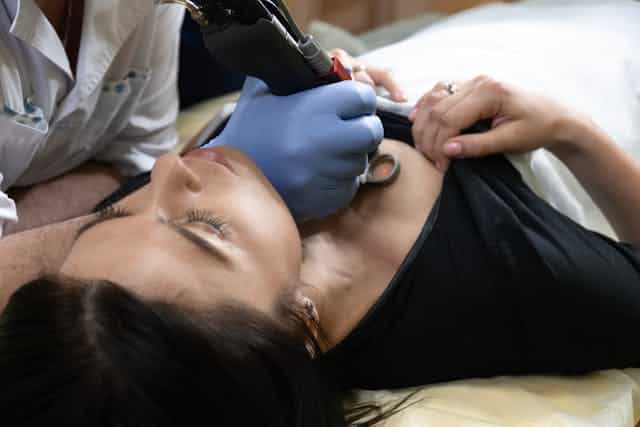Which Techniques Can Help Overcome the Fear of Needles in Medical Settings?

Navigating the medical landscape can be a daunting task, particularly when it causes significant fear or anxiety. Among the common phobias, a fear of needles, known as needle phobia, is widespread and can be extremely debilitating for patients. It can lead to avoidance of necessary medical care, cause distress and negatively impact a person's health. Today, we'll be delving into the realm of needle-induced fear and anxiety in medical settings. We'll discuss its prevalence, its impact, and most importantly, the various strategies and techniques that can help people manage this fear.
Understanding Needle Phobia
Before we explore how to combat this fear, it's crucial to understand what needle phobia is and how it manifests itself. Needle phobia is a fear that causes extreme anxiety and distress at the sight or thought of needles, especially in a medical context. It can be triggered by injections, blood tests, and other medical procedures involving needles.
A voir aussi : How to Optimize Sleep Quality for Shift Workers?
Children are often the most impacted demographic when it comes to needle phobia. Pediatric care can become particularly challenging as needle-related procedures, such as vaccinations, are a routine part of a child's healthcare. However, this phobia is not exclusive to children and can persist into adulthood.
The fear of needles can be complex and multifaceted. Some people may fear the pain associated with needle pricks, while others may be afraid of seeing blood. Still, others may be anxious about the potential health implications of a medical procedure involving needles.
Dans le meme genre : What Are the Latest Findings on Probiotics for IBS Management?
Prevalence and Impact of Needle Phobia
Scientific publications and studies available on scholar platforms such as Google Scholar or PubMed suggest that roughly 20-30% of adults and even more children experience some form of needle phobia. This prevalence shows that needle phobia is not an isolated issue, but a significant public health concern.
The impact of needle phobia goes beyond the fear and anxiety experienced by the patients. It can lead to avoidance of medical care, resulting in untreated or late-diagnosed medical conditions. For example, patients with needle phobia might avoid vaccinations, routine blood tests, or necessary therapeutic injections.
Moreover, the anxiety and distress caused by needle phobia can make medical procedures more difficult and time-consuming. In extreme cases, it might require sedation or physical restraint, adding to healthcare costs and patient distress.
Techniques to Overcome Needle Phobia
Fortunately, there are various strategies available to manage and overcome needle phobia. These strategies can help reduce the fear and anxiety associated with needles, making medical procedures less distressing and more manageable for patients.
Cognitive-Behavioral Therapy (CBT)
Cognitive-Behavioral Therapy (CBT) is a well-established therapeutic approach that can be effective in managing various phobias, including needle phobia. This therapy focuses on identifying and challenging unhelpful thoughts and behaviours while developing coping strategies.
It can help patients understand that their fear reaction is disproportionate to the actual threat posed by needles. Through gradual exposure to needles and injections in a safe and controlled environment, patients can gradually desensitize themselves and reduce their fear.
One strategy used within CBT is distraction. For example, during an injection, patients might be encouraged to focus their attention on a non-threatening object in the room, or engage in a simple mental task like counting or recalling a pleasant memory.
Applied Tension Technique
The Applied Tension Technique can be particularly useful for people who fear the sight of blood or faint at the prospect of a needle prick. It involves teaching patients to increase their blood pressure and heart rate in response to anxiety, preventing fainting.
Patients are taught to tense their muscles, leading to an increase in blood pressure. This technique, practiced until it becomes a conditioned response, can help people manage their fear of needles, especially those who have a history of fainting during medical procedures.
Medical Devices and Topical Anesthetics
Medical innovations have led to devices and products designed to reduce physical pain and psychological distress associated with needle procedures. For instance, needle-free injection technology, though not widely available, can be a game-changer for people with severe needle phobia.
Topical anesthetics are also a practical resource. These numbing creams or patches are applied to the skin before an injection, and can considerably reduce the pain or discomfort associated with needle pricks, thereby reducing anxiety.
Mindfulness and Relaxation Techniques
Finally, mindfulness and relaxation techniques can be powerful tools in managing needle phobia. This might involve deep breathing exercises, progressive muscle relaxation, or guided visualization. These techniques can help reduce anxiety, focus attention away from the fear, and promote a sense of calm and control.
Involvement of Healthcare Professionals
Healthcare professionals play a critical role in helping patients manage their fear of needles. They should be aware of this phobia, take it seriously, and proactively offer support and solutions to their patients.
This could involve explaining procedures clearly to reduce fear of the unknown, offering distractions during the procedure, or using a smaller gauge needle to reduce pain. Involving the patient in the procedure, such as letting them choose the injection site or the count-off before an injection, can also give them a sense of control and aid in reducing anxiety.
Moreover, healthcare providers should be trained to recognize and manage needle phobia, including knowing when to refer patients to mental health professionals for additional support. By offering empathetic care and employing these techniques, they can significantly help their patients overcome their fear of needles.
The Role of Education in Alleviating Needle Phobia
In addition to therapeutic interventions and medical products, education plays a crucial role in managing needle phobia. Educating patients about the necessity and safety of needle procedures can significantly alleviate fear and anxiety.
Educational resources are readily available on scholar platforms such as Google Scholar and PubMed. Numerous scientific publications and free articles are accessible to the public, providing thorough and reliable information about needle procedures. These articles often include a systematic review of the literature, offering a comprehensive perspective on the topic.
Educating patients about the pain associated with needle procedures can also be beneficial. It's important to reassure them that the discomfort caused by a needle prick is generally minimal and short-lived. Clear and honest communication can help lessen the fear of the unknown, which often amplifies the fear of needles.
Children and adolescents, who are often most scared of needles, can benefit greatly from education. Encouraging them to ask questions and express their fears can be an effective strategy. Additionally, offering them the chance to practice on a doll or teddy bear can facilitate understanding and ease anxiety.
Finally, education about the health implications of avoiding necessary medical procedures due to needle fear is essential. For instance, explaining the importance of vaccinations or blood tests in preventing and detecting diseases can motivate patients to overcome their fear.
Healthcare professionals can utilize resources found on platforms such as PubMed Google, PMC free, and Google Scholar to inform their patient education strategies and stay up-to-date on the latest research and best practices.
Conclusion: Overcoming Needle Phobia is Achievable
In conclusion, overcoming the fear of needles is an achievable goal. It requires understanding, patience, and the use of various strategies and techniques. Resources are available through numerous avenues, such as the PubMed Google platform, where free articles and systematic reviews are accessible to the public.
Remember, needle phobia is a complex and multifaceted fear that can cause significant distress and impact an individual's health care. It's crucial for healthcare professionals to recognize and take this fear seriously, offering support and solutions where needed.
By utilizing techniques such as Cognitive-Behavioral Therapy, Applied Tension Technique, mindfulness, and relaxation practices, patients can gradually desensitize themselves and reduce their fear. Innovations in medical devices and the use of topical anesthetics can also play a critical role in managing this phobia.
Moreover, education plays an invaluable role in overcoming needle phobia. Clear communication about the necessity and safety of needle procedures, as well as the health implications of avoiding them, can significantly alleviate fear and anxiety.
With the right approach and resources, patients can successfully navigate their fear, enabling them to receive necessary medical care without distress. Equipping healthcare professionals with the proper training and tools will ensure they can provide empathetic and effective care to those suffering from needle phobia.
In the end, overcoming needle phobia not only improves the experience of medical procedures but also contributes to better health outcomes. As the saying goes, "Knowledge is power." With the right information, techniques, and support, anyone can conquer their fear of needles.
